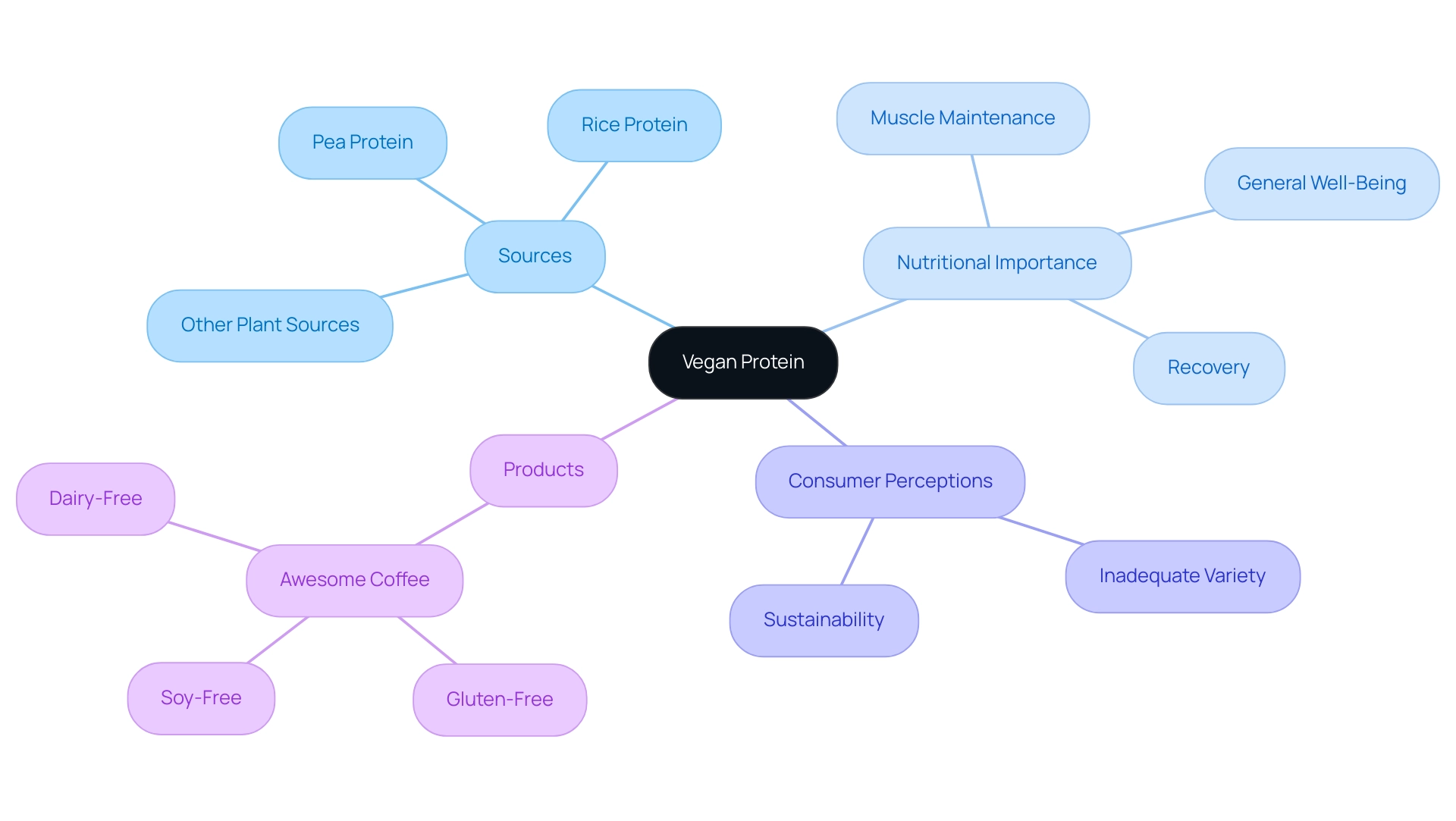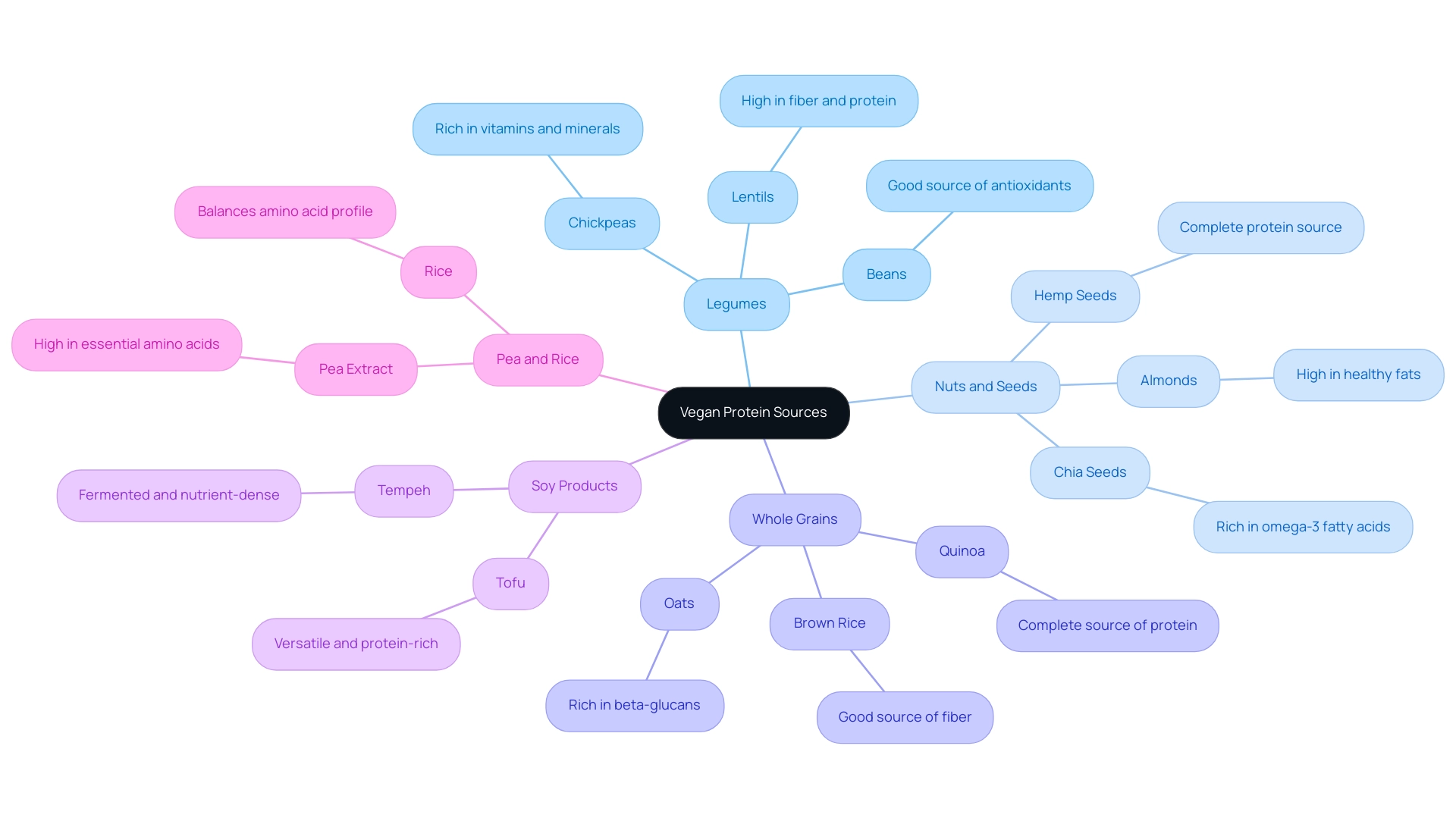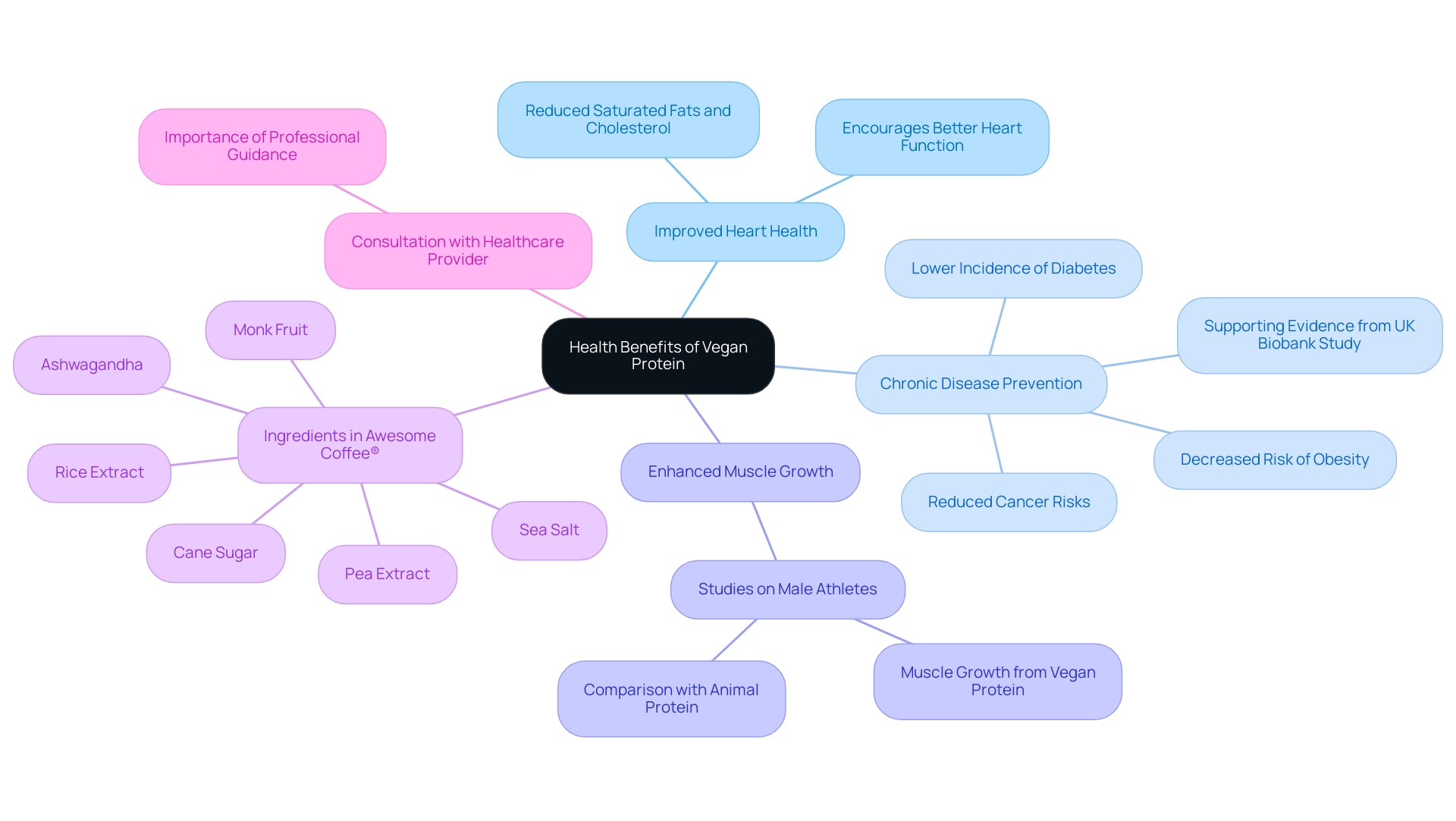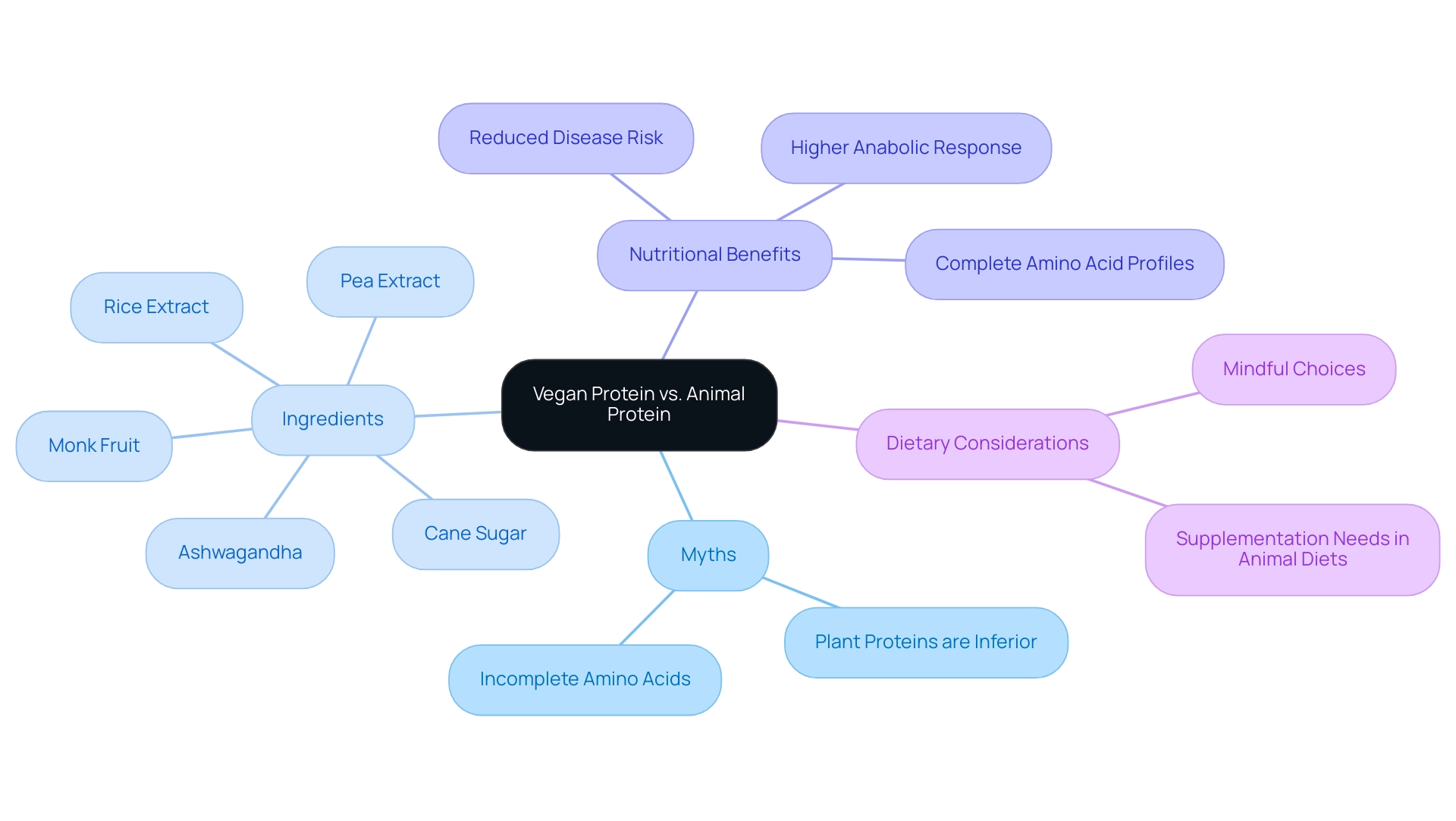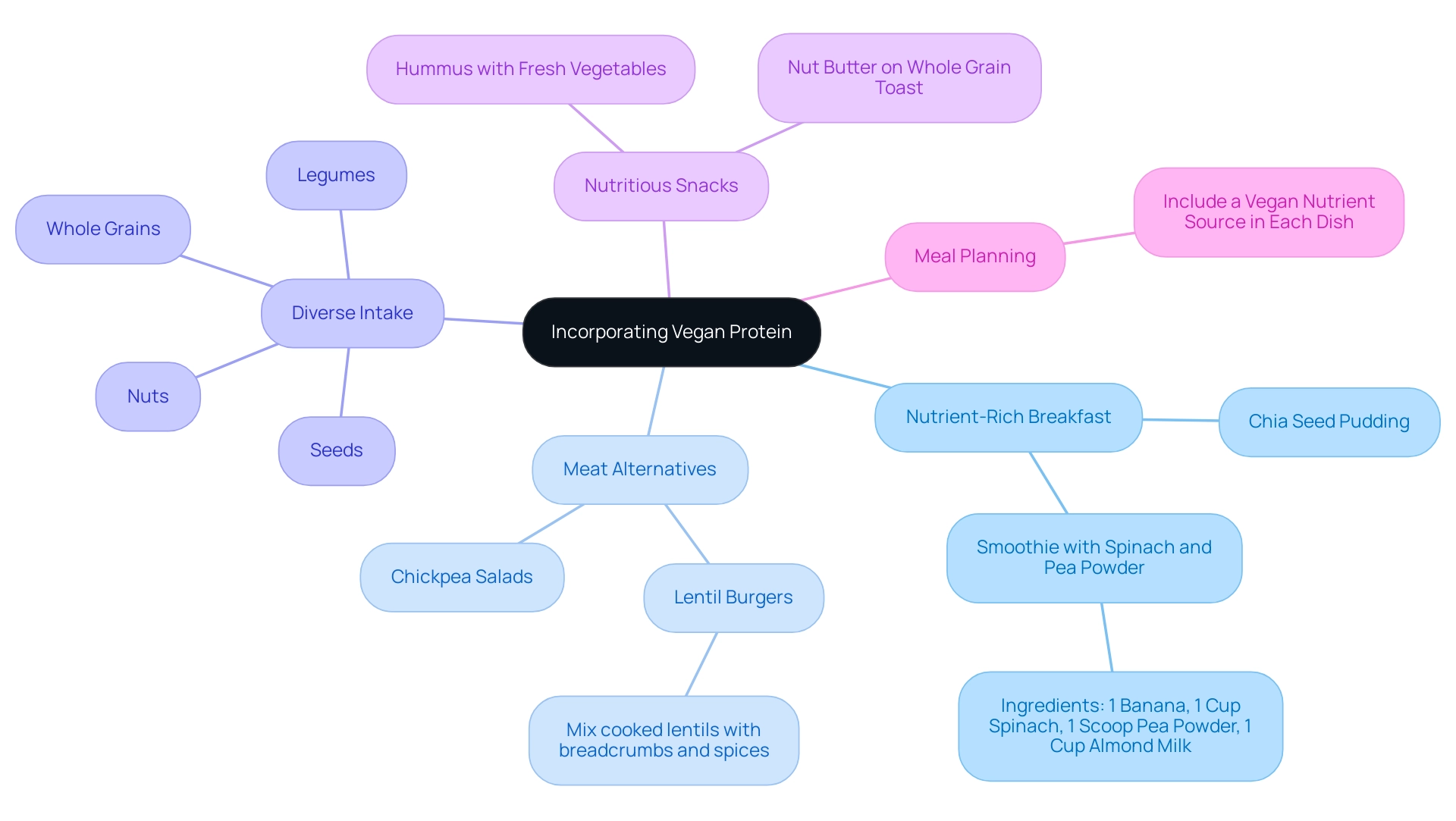Introduction
The rise of plant-based diets has sparked a growing interest in vegan protein, a crucial component for those seeking to maintain health and wellness without animal products. Defined as protein derived solely from plant sources, vegan protein plays a vital role in muscle maintenance, repair, and overall health.
With innovative products like Awesome Coffee, which combines pea and rice protein to deliver a substantial protein boost, consumers are now presented with diverse options to meet their nutritional needs.
This article delves into the various sources of vegan protein, explores its health benefits, and addresses common misconceptions, ultimately providing practical tips for seamlessly integrating these proteins into daily diets.
As the demand for sustainable and nutritious food options increases, understanding the value of vegan protein becomes essential for anyone looking to enhance their dietary choices.
1. Defining Vegan Protein: What It Is and Why It Matters
Vegan protein sources of nourishment are defined as nutrients obtained exclusively from plant origins, completely excluding any animal products. For people adhering to a meat-free or vegetarian diet, it is essential to include vegan protein to fulfill their nutritional requirements for muscle upkeep, recovery, and general well-being. Awesome Coffee exemplifies a high-protein beverage that incorporates sources of vegan protein, such as pea and rice, providing 13 grams of clean nutrients per serving.
While animal-based nutrients are often viewed as whole due to their extensive amino acid profile,
plant-derived sources, such as vegan protein, differ significantly and may require thoughtful pairings to achieve a comparable completeness. In fact, a recent study revealed that individuals in the fourth quartile of unprocessed nutrient intake had an odds ratio of 12.42 compared to those in the first quartile, emphasizing the critical role of quality sources of nourishment in overall well-being. Moreover, as indicated by a report, 69% of consumers believe there is an inadequate range of plant-based products or brands available, emphasizing the increasing demand for varied plant-derived options like Awesome Coffee.
A comprehensive understanding of vegan protein and plant-based nutrition is essential, as it empowers individuals to make informed dietary choices that align with their health objectives and ethical values. The ecological effect of plant-based alternatives, including items like Awesome Coffee, which is usually viewed as more sustainable than animal meat, further highlights the significance of including vegan protein sources in diets. As more consumers acknowledge the advantages of diets focused on plants, the increasing awareness and acceptance of vegan protein alternatives highlight their importance in modern nutrition.
Furthermore, Awesome Coffee is gluten-free, soy-free, and dairy-free, making it suitable for various dietary preferences. Common questions include its taste, which is comparable to iced coffee, and its serving size, with each bag containing 15 servings, allowing for convenient use in daily routines.
2. Exploring the Rich Sources of Vegan Protein
Vegan protein can be sourced from a variety of plant-based foods, each providing unique health advantages. Legumes, such as lentils, chickpeas, and different beans, are recognized as abundant sources of nutrients. However, they typically exhibit lower levels of the essential amino acid methionine, while other plant foods may be deficient in lysine.
This emphasizes the significance of diversifying sources of nourishment. Notably, pea extract, derived from dried peas processed into a powder form, serves as an exceptional source of vegan protein for vegans and vegetarians seeking a nutritious option. Being high in essential amino acids, it serves as a valuable source of vegan protein in plant-based diets.
Furthermore, rice enhances pea by providing a balanced amino acid profile, improving overall nutritional intake.
Nuts and seeds, including almonds, chia seeds, and hemp seeds, are outstanding additions to a diet high in vegan protein, offering healthy fats along with essential nutrients. Whole grains such as quinoa, brown rice, and oats not only contribute fiber but also improve the nutritional profile of meals. Quinoa is acknowledged as one of the rare complete sources of vegan protein, containing all nine essential amino acids required for human well-being.
Furthermore, soy items, such as tofu and tempeh, are highly valued for their nutritional content and adaptability in cooking, as they are rich in vegan protein.
Studies have shown that plant-derived substances may provide protective advantages for kidney function, especially in those with chronic kidney disease. A study titled 'Plant-Based Nutrients and Their Renoprotective Effect' revealed that regular consumption of these nutrients is associated with lower mortality rates and improved kidney function. Therefore, incorporating a diverse mix of these sources, including vegan protein from pea and rice, not only supports adequate intake but also enhances overall health and well-being, especially for those with specific dietary needs.
Moreover, the FAO indicates that DIAAS scores are not capped at 100%, highlighting the significance of assessing nutrient quality when evaluating vegetable sources. The relationship between plant-based food consumption and muscle synthesis in older adults remains complex and warrants further research, as it may influence dietary choices for this demographic. Furthermore, recent advancements in
plant-based egg substitutes emphasize the necessity for these products to mimic the functional characteristics of real eggs, demonstrating the versatility and creativity within the domain of plant-derived food sources.
As the nutritional profiles of these sources continue to be analyzed, awareness of the benefits of vegan protein in maintaining a balanced diet remains essential. Incorporating recipes that utilize pea-based ingredients can also enhance its appeal, making it easier for individuals to include this nutritious option in their daily meals.
3. Health Benefits of Incorporating Vegan Protein
Incorporating vegan protein sources into one's diet provides a variety of advantages, particularly when considering items such as Awesome Coffee®. Plant-derived sources usually have reduced amounts of saturated fats and cholesterol compared to their animal equivalents, encouraging improved heart health. Awesome Coffee® is made from high-quality, vegetable-derived ingredients such as:
- Pea extract
- Rice extract
- Cane sugar
- Monk fruit
- Sea salt
- Ashwagandha
These ingredients are abundant in essential nutrients, including fiber, vitamins, and minerals, promoting overall wellness.
Recent studies highlight that diets rich in vegetable sources correlate with decreased risks of chronic illnesses such as obesity, diabetes, and certain cancers. For instance, the UK Biobank study, which analyzed health data from a diverse cohort of 500,000 individuals, highlights the positive health outcomes associated with vegetarian and vegan diets. Moreover, the fiber content present in vegetable sources not only aids digestion but also improves satiety, supporting the upkeep of a healthy weight.
Importantly, studies published in the American Journal of Clinical Nutrition show that male athletes consuming vegan protein from vegetable-derived nutrients, akin to those present in Awesome Coffee®, experienced considerable muscle growth after exercise. Furthermore, Awesome Coffee® is manufactured in a registered allergen-free facility, ensuring its commitment to quality and safety, and is Kosher and Organic Certified. It is important to
consult a primary care provider before making significant dietary changes to ensure they align with individual wellness needs.
These findings collectively illustrate the significant health advantages linked to the consumption of plant-based sources, particularly vegan protein, reinforcing their role in chronic disease prevention and overall health improvement.
4. Vegan Protein vs. Animal Protein: Debunking Myths
A common misunderstanding is that plant-based sources of nutrition are inferior to their animal-based counterparts regarding quality and efficacy. However, Awesome Coffee® is crafted with high-quality ingredients that provide vegan protein, including:
- Pea extract
- Rice extract
- Cane sugar
- Monk fruit
- Ashwagandha
This ensures a stellar amino acid profile that is rich in essential amino acids. Although many plant-based sources are categorized as incomplete, they can be combined strategically throughout the day to form complete amino acid profiles.
A classic example is the combination of rice and beans, which together provide all essential amino acids necessary for optimal health. Recent studies suggest that a meticulously planned vegan diet, enriched with high-quality sources like Awesome Coffee®, is capable of providing vegan protein effectively, supporting both muscle growth and recovery comparably to a diet abundant in animal proteins. Data suggests that 100 grams of such nutrients can elicit a higher and more prolonged anabolic response, underscoring the effectiveness of plant sources in muscle development.
Furthermore, the review titled '
Nutrient Adequacy of Vegetarian Diets' highlights that higher plant-based intake is associated with a reduced risk of various diseases, indicating a potential for better health outcomes. This is especially pertinent when considering that many animal sources may require supplementation, as evidenced by the need for cows raised for meat to receive B12 or cobalt supplements due to dietary deficiencies. Additionally, as Antonio and colleagues illustrated, the propensity for overconsumption of energy-dense foods like peanut butter can lead to weight gain, prompting a need for mindful dietary choices.
This understanding is crucial for individuals contemplating a shift to a plant-based lifestyle or those seeking to incorporate more plant-derived foods into their dietary habits. With its Kosher and Organic certifications, Awesome Coffee® serves as an excellent choice for a nutritious beverage that contains vegan protein and is vegan-friendly.
5. Practical Tips for Incorporating Vegan Protein into Your Diet
To effectively incorporate vegan protein sources into your diet, consider these essential strategies:
- Start your day with a nutrient-rich breakfast by integrating options such as chia seed pudding or a smoothie that includes vegan protein from spinach and pea powder, leveraging its health benefits. For a delicious smoothie, blend 1 banana, 1 cup of spinach, 1 scoop of pea powder, and 1 cup of almond milk.
- Explore meat alternatives by preparing dishes like lentil burgers or chickpea salads, which serve as hearty main courses, showcasing the culinary versatility of plant-based sources.
For a lentil burger, mix cooked lentils with breadcrumbs, spices, and form patties to grill.
- Ensure a diverse intake of legumes, nuts, seeds, and whole grains in your meals to incorporate vegan protein and achieve a balanced array of amino acids, essential for muscle building and overall health.
- Utilize snacks that are rich in nutrients, such as hummus paired with fresh vegetables or nut butter spread on whole grain toast, to enhance your intake throughout the day.
- Plan your meals in advance to guarantee the inclusion of a vegan nutrient source in each dish, facilitating adherence to a balanced diet.
Significantly, historical information from
Mirone suggests that in 1950, a group of vegetarians consuming approximately 50 grams of total nutrients, supplemented by around 6 grams of animal-derived nutrients, maintained good health, as reflected in their normal hematology and blood chemistry markers. This serves as an early indication of the potential for plant-based combinations, including pea-derived substances, to replace animal sources effectively.
Moreover, the FAO's 2011 suggestion to shift to the digestible indispensable amino acid score (DIAAS) highlights the significance of digestibility in assessing quality, offering a more precise evaluation of vegan protein derived from vegetable sources. Additionally, recent findings from Pinckaers et al. suggest that more processed plant-based proteins, like pea protein, may benefit older vegans in stimulating muscle synthesis, highlighting the importance of these sources in modern diets.
Conclusion
The exploration of vegan protein reveals its critical role in modern nutrition, particularly as more individuals gravitate towards plant-based diets. By understanding that vegan protein is derived exclusively from plants, consumers can make informed choices that support muscle maintenance, repair, and overall health. Products like Awesome Coffee not only provide a substantial protein boost but also highlight the growing variety of vegan options available, catering to diverse dietary preferences and needs.
Incorporating a wide array of plant-based protein sources—from legumes and nuts to whole grains—ensures a balanced intake of essential amino acids, which is vital for optimal health. The health benefits associated with vegan protein consumption are substantial, including lower risks of chronic diseases and improved heart health. Furthermore, addressing common misconceptions about the quality of plant-based proteins empowers individuals to confidently integrate these sources into their diets, demonstrating that vegan protein can be just as effective for muscle growth and recovery as animal protein.
To maximize the benefits of vegan protein, practical strategies for incorporation are essential. Simple adjustments, such as:
- Starting the day with a protein-rich breakfast
- Exploring meat alternatives
can significantly enhance dietary protein intake. As awareness of vegan protein’s advantages continues to grow, embracing these dietary choices not only supports personal health goals but also contributes to a more sustainable food system. Ultimately, the shift towards plant-based nutrition is not just a trend; it is a commitment to better health and a more ethical lifestyle.
